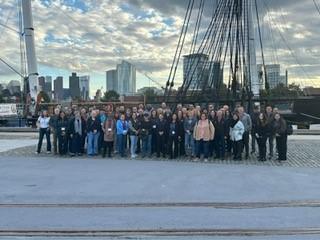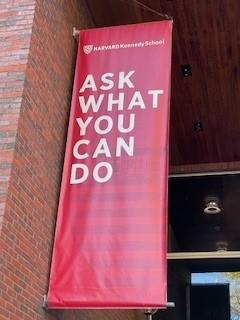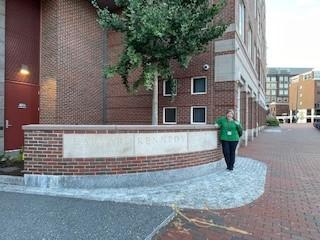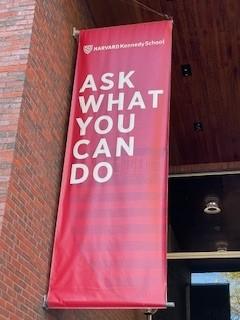By the APS Academy
Tania Rishniw, Deputy Secretary at the Department of Employment and Workplace Relations shares her experiences of being a Sir James Wolfensohn Public Service Scholarship recipient. The scholarship to the Harvard Kennedy School in the United States, established in 2012, is awarded to senior Australian public servants to promote the development and delivery of good public policy. Recipients are chosen for their potential to make significant contributions to Australian society through innovative public policy initiatives.

Senior Managers in Government, class of 2023
Why did you apply for the opportunity?
After working in the Department of Health through the COVID pandemic, I was looking for an opportunity to reinvest in my own development. COVID was an amazing opportunity to test my leadership skills and crisis management skills, but didn’t allow any time for formal learning. The Wolfensohn scholarship was timely, because for a few years I had been so busy juggling work priorities, I hadn’t invested in my professional development. I had previously completed the Executive Masters in Public Administration through the Australia and New Zealand School of Government (ANZSOG), attended a range of APSC courses, along with a number of courses through the ANU Crawford School of Public Policy. I was looking to build on this learning and the scholarship was suggested by my Secretary.
I was really looking for something that gave me an international perspective as I had a good understanding of the domestic policy context. Harvard ticked that box, and carried immediate recognition as a well known and well regarded institution. I knew of a few people who had previously completed the scholarship and spoke highly of it, and that made it more attractive.
So in terms of why this opportunity and why at this time? It was a great combination of looking for the next stage in my professional development, looking for an international lens on public policy and having exposure to the latest thinking around leadership. It was also the post COVID timing and having exhausted a lot of the things that I'd wanted to do in Australia.
What APS craft, skills and knowledge have you already acquired to make you ready for / able to benefit from, the Harvard program?
I've worked in seven different Commonwealth agencies over my career. I have good networks across the public service, both at Commonwealth and state and territory levels, because of the kind of roles that I've had. I felt I had a good Australian network. The Wolfensohn scholarship and particularly the Harvard Executive Education program, gives you a wider network, as well as the international perspective. It is also at the forefront of public sector leadership theory and practice. It was a chance to expand my network on the international stage, and once again meet with people who are leaders in their field. The course focused on learning through case studies and sharing of experience among senior government leaders. This was particularly attractive as all 50 participants provided different experiences and approaches to things which in itself, is a great learning opportunity.

Tell us about the program you undertook and its effect on your future contributions as a public servant?
I attended the Senior Government Leaders program, which is a flagship Harvard Executive education program. There was a really varied cohort with two thirds of the class being US based and included Deputy Secretary and CEO level participants. For a lot of them, this was their first taste of high level executive education, with that level of insight and access to such a wide range of people who are leaders in their field.
You go in with the expectation that Harvard is one of the best universities in the world. The course gave us a range of sessions, including: the latest behavioural insights into recruitment and workforce development; leadership through crisis; use and application of AI; and negotiation strategies. It was great to know that I now have access to the latest thinking and research on what we're facing as a public service in Australia.
It was interesting because the experience gained was universal for each of the course participants. We each have different systems of government. We have slightly different responsibilities across public services across the world, but the defining challenges – policy, workforce, leadership - are universal. This all worked to make me a better-informed leader and it gives me a different toolbox to use in terms of my leadership and my contribution to the APS.
One example of the immediate returns to that APS relates to the current APS discussion that we've been having on how we advertise public service roles, which affects who applies and the diversity of people who apply. I can cite several different latest research pieces around why we should be advertising flexible, part time, location agnostic jobs and how we frame them.
Another of the immediate returns is around ‘leadership in crisis’ and particularly reflecting on what we've been through in Australia over the last 4 years with COVID and how to make use of those learnings. It also goes to the next piece around the ‘net zero’ policy challenge, and all of those competing policy priorities. We had a session on Artificial Intelligence (AI) with Professor Dan Levy, Senior Lecturer in Public Policy where we ran some random tests on college application essays. Despite our collective confidence that we would be able to pick the AI generated content, we failed completely. So it was a really useful reminder that we all need to park our assumptions and biases at the door when developing and implementing policy.
Did you face any challenges in implementing your learning on your return to Australia?
I had to temper my enthusiasm for saying “here’s what I have learned at Harvard” at every opportunity. I was moving into a new department at that time and fortunately came back to an environment that was curious and wanted to hear what the latest thinking was, and where it was headed. If anything, the challenge was processing all of that and then working out where and how to apply it to the Australian context.
A few weeks after my return, I was able to reflect on my leadership, what I’ve taken away from the scholarship program and the big things that I wanted to take back to my workplace. The thinking around, for example, what does ‘AI’ mean for our organisation? What does ‘automated decision making’ mean? What does ‘beneficial impact for the end user’ mean and how do we look at that when we're trying to reform employment services and plan for the workforce challenges of the future?
I am able to take what I've learned and think about applying it in the Australian context. It is also comforting to know that all public servants, across the globe, are facing similar challenges.
I think it is fair to say that the Australian Public Service is still a little bit gun shy about AI. But we need to be thinking about AI as a part of the landscape, that it's here to stay. How then do you use it for things like progressing equity? How might it unlock opportunities that we haven't thought about? How does it free up our workforce to do the things that matter most? And how do we make sure there is still that continuous test of how does this impact the Australian public that we serve? I was keen for that conversation and I think Australia is still catching up to that, but it's great to see it being addressed.





